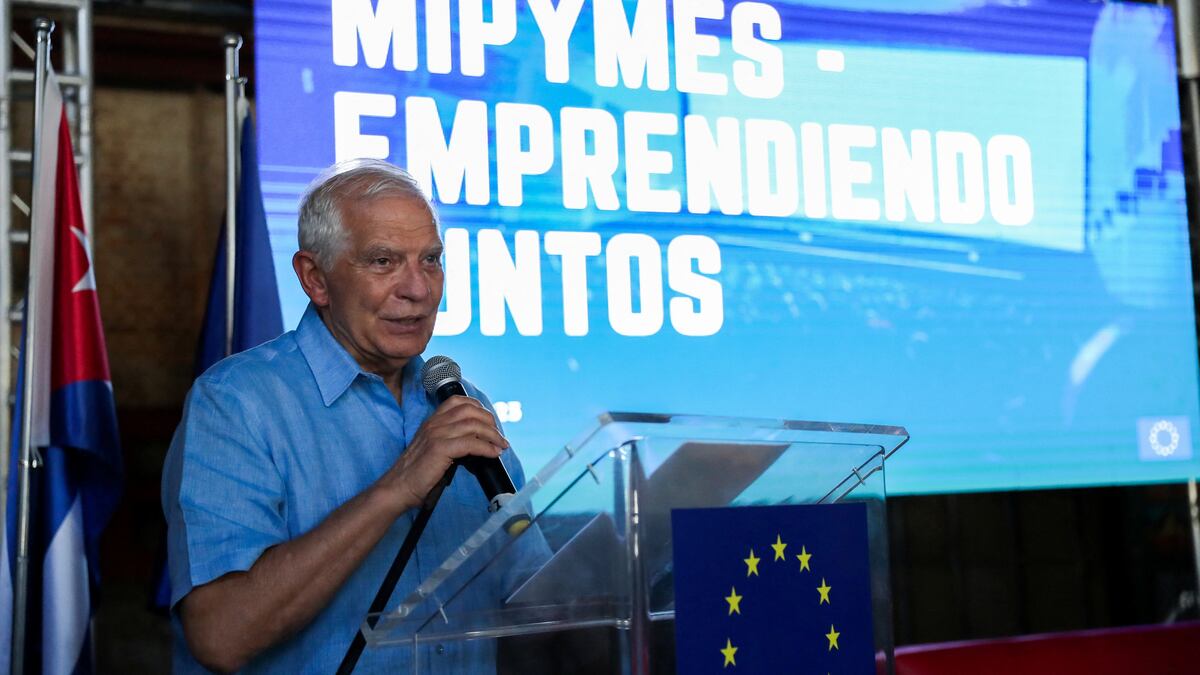Josep Borrell, the head of European diplomacy, during an official ceremony in Havana.YANDER ZAMORA (REUTERS)
Josep Borrell's first trip to Havana as high representative of the Foreign Policy of the European Union began this Thursday with a clear show of support for the increasingly important Cuban private sector and a message to the authorities that Brussels is willing to collaborate in the deepening of the economic reform taking place on the island. when the country is going through one of the worst crises in its history, which has resulted in unprecedented social unrest. Borrell's visit, which will last until Saturday, comes at a particularly complex time for the government of Miguel Díaz-Canel, which in recent months has exponentially increased its rapprochement with Russia both economically and politically. Faced with this situation, European diplomacy tries to keep open the channels of dialogue and influence, preserving the spaces created since 2017 with the Political Dialogue and Cooperation Agreement between Cuba and the EU, which put an end to the two decades of distancing that was the so-called European common position promoted by former Spanish President José María Aznar.
Within this dialogue, for the Twenty-seven, the always delicate issue of progress in human rights is of the utmost importance, which will be discussed on Friday in the official talks and which generates not a few frictions on the Cuban side, although at least now it is possible to speak officially. For Havana, one of the key issues is that of European condemnation of the US embargo and support for its diplomatic efforts so that the Biden Administration removes the island from the list of countries sponsoring terrorism, something that Borrell has already raised in the past with his interlocutors in Washington, although nothing has moved so far. The image in Cuba, basically, remains one of the Cold War, with Russia increasingly close and immersed in the war in Ukraine and the Cuban government entrenched in the face of US policy, which it considers the cause of all its ills. Faced with this scenario, Europe plays its cards, which are of "constructive" but at the same time "critical" engagement on various issues; That is, do not break the deck and gradually make progress.
In the midst of the current galloping crisis, the green light given in 2021 to the creation of private MSMEs (micro, small and medium enterprises), with legal personality and up to 100 workers, has opened a new scenario on the island. Nearly 8,000 have already been created, and although they still operate with many bureaucratic obstacles, they have changed Cuba's economic landscape – one in three Cubans already work in the private sector, which contributes almost 12% of GDP, a reality unthinkable just a decade ago.
On his first day in Cuba, Borrell also held a meeting with the Cuban episcopate, and on Friday he will meet with Cuban Foreign Minister Bruno Rodríguez to hold the third EU-Cuba Joint Council, as part of the Political Dialogue and Cooperation Agreement between Cuba and the European Union. The last physical meeting of this format was held in September 2019, when EU diplomacy was still in the hands of Federica Mogherini. A month later, Borrell traveled to Havana, although as Spanish Minister of Foreign Affairs, in one of his last missions before assuming the diplomatic portfolio from the Italian, in December of that year. Two years later, in 2021, already with Borrell at the helm, the appointment was limited to a mere informal meeting by videoconference, due to the pandemic.
Before Borrell's trip to Cuba, several NGOs asked him to address the issue of the more than 700 prisoners for the massive demonstrations of July 11, 2021 – something that Borrell already condemned at the time – and demand their release. It is unknown how this issue will be addressed, and whether the head of European diplomacy will ask for some kind of "gesture" from the Cuban side. It is presumable that it will happen, but in any case it will be discreet, since the current European position is to keep the channels of communication open in order to exert influence, in addition to the fact that Borrell's visit must also be read as a multilateral key, as part of the EU's rapprochement with Latin American and Caribbean countries on the eve of the next EU-CELAC summit, to be held in Brussels on 17 and 18 July. European sources point out that Cuba is an "important voice" among developing countries as president pro tempore of the group of 134 developing countries that make up the G-77 + China.
Subscribe hereto the newsletter of EL PAÍS Mexico and receive all the informative keys of the news of this country

